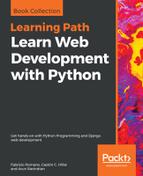After we create our first Django project and then a Django app, there are many new folders and files. First, use your favorite editor or IDE to check the Python code in the apps.py file within the restful01/toys folder (restful01 oys in Windows). The following lines show the code for this file:
from django.apps import AppConfig
class ToysConfig(AppConfig):
name = 'toys'
The code declares the ToysConfig class as a subclass of the django.apps.AppConfig class that represents a Django application and its configuration. The ToysConfig class just defines the name class attribute and sets its value to 'toys'.
Now, we have to add toys.apps.ToysConfig as one of the installed apps in the restful01/settings.py file that configures settings for the restful01 Django project. I built the previous string by concatenating many values as follows: app name + .apps. + class name, which is, toys + .apps. + ToysConfig. In addition, we have to add the rest_framework app to make it possible for us to use Django REST framework.
The restful01/settings.py file is a Python module with module-level variables that define the configuration of Django for the restful01 project. We will make some changes to this Django settings file. Open the restful01/settings.py file and locate the highlighted lines that specify the strings list that declares the installed apps. The following code shows the first lines for the settings.py file. Note that the file has more code:
"""
Django settings for restful01 project.
Generated by 'django-admin startproject' using Django 1.11.5.
For more information on this file, see
https://docs.djangoproject.com/en/1.11/topics/settings/
For the full list of settings and their values, see
https://docs.djangoproject.com/en/1.11/ref/settings/
"""
import os
# Build paths inside the project like this: os.path.join(BASE_DIR, ...)
BASE_DIR = os.path.dirname(os.path.dirname(os.path.abspath(__file__)))
# Quick-start development settings - unsuitable for production
# See https://docs.djangoproject.com/en/1.11/howto/deployment/checklist/
# SECURITY WARNING: keep the secret key used in production secret!
SECRET_KEY = '+uyg(tmn%eo+fpg+fcwmm&x(2x0gml8)=cs@$nijab%)y$a*xe'
# SECURITY WARNING: don't run with debug turned on in production!
DEBUG = True
ALLOWED_HOSTS = []
# Application definition
INSTALLED_APPS = [
'django.contrib.admin',
'django.contrib.auth',
'django.contrib.contenttypes',
'django.contrib.sessions',
'django.contrib.messages',
'django.contrib.staticfiles',
]
Add the following two strings to the INSTALLED_APPS strings list and save the changes to the restful01/settings.py file:
- 'rest_framework'
- 'toys.apps.ToysConfig'
The following lines show the new code that declares the INSTALLED_APPS string list with the added lines highlighted and with comments to understand what each added string means. The code file for the sample is included in the hillar_django_restful_01 folder:
INSTALLED_APPS = [
'django.contrib.admin',
'django.contrib.auth',
'django.contrib.contenttypes',
'django.contrib.sessions',
'django.contrib.messages',
'django.contrib.staticfiles',
# Django REST framework
'rest_framework',
# Toys application
'toys.apps.ToysConfig',
]
This way, we have added Django REST framework and the toys application to our initial Django project named restful01.
